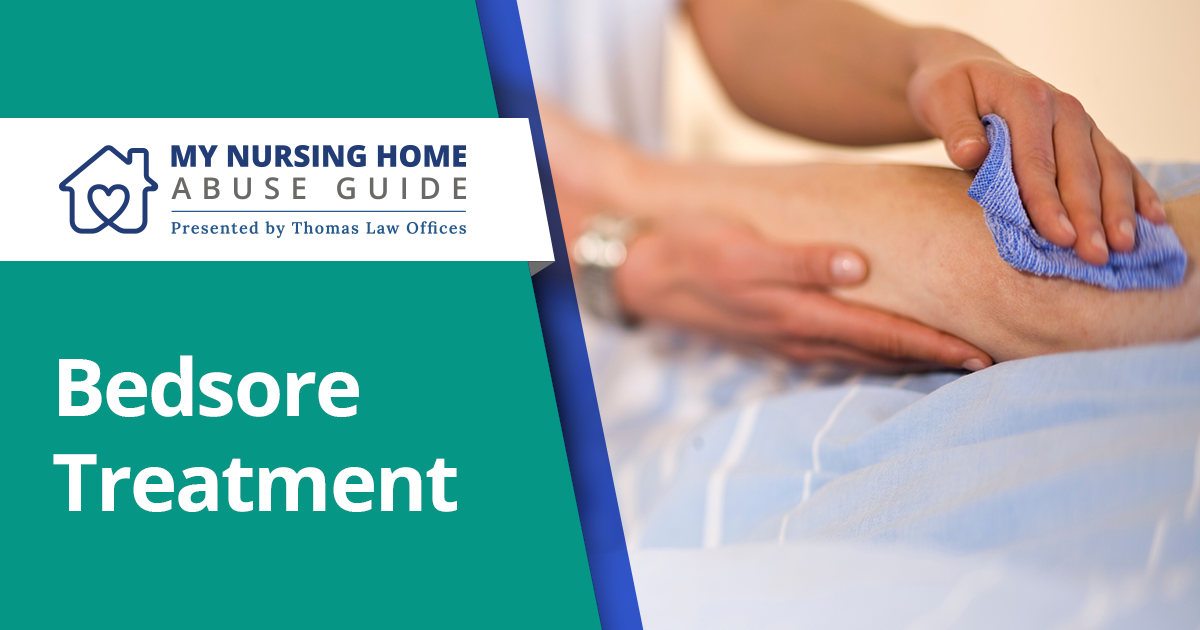
You’ve noticed that your nursing home resident loved one has bedsores. What do you do? The first course of action needs to be getting them immediate medical attention. So, do you call an ambulance and have them transported to the hospital or take their general practitioner to an urgent care facility or the emergency room? Bedsore treatment options may vary depending on the stage of the pressure ulcer, as we’ll detail below.
Approaches Used for Treating Pressure Injuries
According to the Mayo Clinic, the following steps should be followed to treat bedsores:
- Pressure and friction responsible for causing the injury must be reduced: This means repositioning or the use of cushions or other supportive surfaces must occur.
- Wounds must be cleaned and dressed: Using saline is particularly important for open wounds, and it’s imperative that one regularly cleans the sore and changes the bandage covering it.
- Tissue removal: Any infected or dead tissue must be eliminated by a medical professional through a process called debridement.
- Initiating pain management: Pressure sores can be quite painful, especially if they’ve affected the nerves or bone or are seriously infected, which is when patients may need to be administered anti-inflammatory medications like naproxen sodium or ibuprofen to help them manage their pain.
- Considering surgical intervention: Severely infected bedsores, ones that have destabilized bone or impinged nerves, or ones that cover a large portion of the body may need to be addressed in surgery.
Doctors Who Treat Bedsores
Your priority should be to see a health care provider as soon as you notice a bedsore. If you, your family member, or a beloved friend has a physician they regularly see, you may want to reach out to them for their advice as to whether to visit their office for bedsore treatment or to immediately proceed to a hospital instead.
In most cases, unless it’s an early-stage pressure injury, you can expect a general practitioner to advise their patient to visit an emergency room where comprehensive services, including radiology, a laboratory, and a pharmacy, are available on premises. At the hospital, the following types of doctors may play a role in initially diagnosing a patient with decubitus ulcers:
- An emergency room physician
- A radiologist
- A pathologist
Other doctors and support staff may be brought in to assess or treat a patient with bedsores depending on their severity, including some of the following:
- A wound care specialist: These are generally nurses who have undergone special training in cleaning potentially infected wounds, applying wound dressings, managing incision drains, and monitoring for post-surgical complications.
- Neurologists: Since more advanced-stage bedsores can permeate the upper levels of the skin into the lower ones, within which nerves lie, this may cause a neurological impact, necessitating the intervention of this physician to advise the patient if they need to undergo further treatment for nerve damage.
- Orthopedists: These are doctors who specialize in treating musculoskeletal injuries. Since advanced-stage pressure injuries can affect the bones, orthopedic doctors may be called upon to disinfect the wound, cut away at infected tissue, administer medications to the injury site, or implant medical devices to replace damaged bones or joints.
- Intensivists: According to the Sepsis Alliance, this is the official name given to doctors who circulate within the intensive care at a hospital. Placing a patient in a critical care unit like this is often necessary when their infected bedsore has been allowed to linger on so long that they’ve developed the potentially deadly infectious disease, sepsis.
- Physical or occupational therapists: Bedsore patients may find it challenging to walk or experience functional impairments that inhibit their ability to engage in regular, everyday activities. It may be necessary to get these types of therapists involved to help residents restore some basic functionality before allowing them to return to living in a nursing home.
- Mental health counselors: Since one of the leading causes of bedsores is neglect, it may be necessary for a patient with this condition to receive intensive therapy to help them cope with the depression, anxiety, or any other psychological, be it emotional or behavioral, that the social isolation or inattentiveness by nursing home staff leading up and after the onset of their pressure injuries, caused.
- Plastic surgeons: Decubitus ulcers can cause disfigurement, and depending on the nature of the injury, a patient may need or desire plastic surgery to help reduce the appearance of scarring.
Treating bedsores is not impossible, but it greatly depends on the stage at which it’s identified. Having the right doctors on board to take care of a patient can make all the difference as to whether those bedsore treatment efforts are successful or not.
